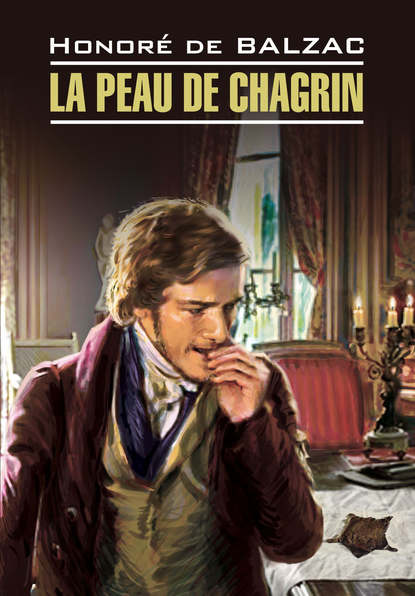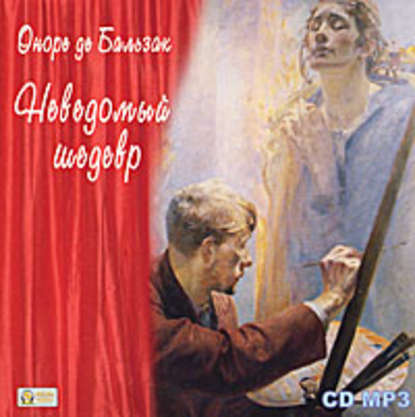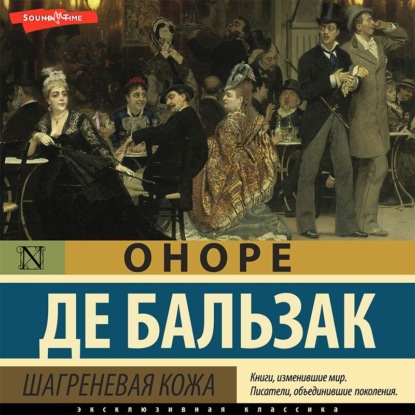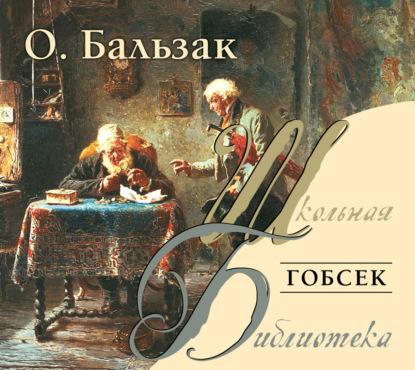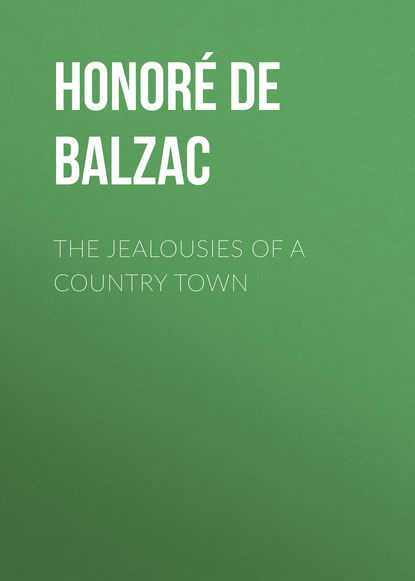
Полная версия
The Jealousies of a Country Town
Besides his fiction of an annuity, about which no one at the present time knew anything, the chevalier really had, therefore, a bona fide income of a thousand francs. But in spite of this bettering of his circumstances, he made no change in his life, manners, or appearance, except that the red ribbon made a fine effect on his maroon-colored coat, and completed, so to speak, the physiognomy of a gentleman. After 1802, the chevalier sealed his letters with a very old seal, ill-engraved to be sure, by which the Casterans, the d'Esgrignons, the Troisvilles were enabled to see that he bore: /Party of France, two cottises gemelled gules, and gules, five mascles or, placed end to end; on a chief sable, a cross argent/. For crest, a knight's helmet. For motto: "Valeo." Bearing such noble arms, the so-called bastard of the Valois had the right to get into all the royal carriages of the world.
Many persons envied the quiet existence of this old bachelor, spent on whist, boston, backgammon, reversi, and piquet, all well played, on dinners well digested, snuff gracefully inhaled, and tranquil walks about the town. Nearly all Alencon believed this life to be exempt from ambitions and serious interests; but no man has a life as simple as envious neighbors attribute to him. You will find in the most out-of-the way villages human mollusks, creatures apparently dead, who have passions for lepidoptera or for conchology, let us say, – beings who will give themselves infinite pains about moths, butterflies, or the concha Veneris. Not only did the chevalier have his own particular shells, but he cherished an ambitious desire which he pursued with a craft so profound as to be worthy of Sixtus the Fifth: he wanted to marry a certain rich old maid, with the intention, no doubt, of making her a stepping-stone by which to reach the more elevated regions of the court. There, then, lay the secret of his royal bearing and of his residence in Alencon.
CHAPTER II
SUSANNAH AND THE ELDERS
On a Wednesday morning, early, toward the middle of spring, in the year 16, – such was his mode of reckoning, – at the moment when the chevalier was putting on his old green-flowered damask dressing-gown, he heard, despite the cotton in his ears, the light step of a young girl who was running up the stairway. Presently three taps were discreetly struck upon the door; then, without waiting for any response, a handsome girl slipped like an eel into the room occupied by the old bachelor.
"Ah! is it you, Suzanne?" said the Chevalier de Valois, without discontinuing his occupation, which was that of stropping his razor. "What have you come for, my dear little jewel of mischief?"
"I have come to tell you something which may perhaps give you as much pleasure as pain?"
"Is it anything about Cesarine?"
"Cesarine! much I care about your Cesarine!" she said with a saucy air, half serious, half indifferent.
This charming Suzanne, whose present comical performance was to exercise a great influence in the principal personages of our history, was a work-girl at Madame Lardot's. One word here on the topography of the house. The wash-rooms occupied the whole of the ground floor. The little courtyard was used to hang out on wire cords embroidered handkerchiefs, collarets, capes, cuffs, frilled shirts, cravats, laces, embroidered dresses, – in short, all the fine linen of the best families of the town. The chevalier assumed to know from the number of her capes in the wash how the love-affairs of the wife of the prefect were going on. Though he guessed much from observations of this kind, the chevalier was discretion itself; he was never betrayed into an epigram (he had plenty of wit) which might have closed to him an agreeable salon. You are therefore to consider Monsieur de Valois as a man of superior manners, whose talents, like those of many others, were lost in a narrow sphere. Only – for, after all, he was a man – he permitted himself certain penetrating glances which could make some women tremble; although they all loved him heartily as soon as they discovered the depth of his discretion and the sympathy that he felt for their little weaknesses.
The head woman, Madame Lardot's factotum, an old maid of forty-six, hideous to behold, lived on the opposite side of the passage to the chevalier. Above them were the attics where the linen was dried in winter. Each apartment had two rooms, – one lighted from the street, the other from the courtyard. Beneath the chevalier's room there lived a paralytic, Madame Lardot's grandfather, an old buccaneer named Grevin, who had served under Admiral Simeuse in India, and was now stone-deaf. As for Madame Lardot, who occupied the other lodging on the first floor, she had so great a weakness for persons of condition that she may well have been thought blind to the ways of the chevalier. To her, Monsieur de Valois was a despotic monarch who did right in all things. Had any of her workwomen been guilty of a happiness attributed to the chevalier she would have said, "He is so lovable!" Thus, though the house was of glass, like all provincial houses, it was discreet as a robber's cave.
A born confidant to all the little intrigues of the work-rooms, the chevalier never passed the door, which usually stood open, without giving something to his little ducks, – chocolate, bonbons, ribbons, laces, gilt crosses, and such like trifles adored by grisettes; consequently, the kind old gentleman was adored in return. Women have an instinct which enables them to divine the men who love them, who like to be near them, and exact no payment for gallantries. In this respect women have the instinct of dogs, who in a mixed company will go straight to the man to whom animals are sacred.
The poor Chevalier de Valois retained from his former life the need of bestowing gallant protection, a quality of the seigneurs of other days. Faithful to the system of the "petite maison," he liked to enrich women, – the only beings who know how to receive, because they can always return. But the poor chevalier could no longer ruin himself for a mistress. Instead of the choicest bonbons wrapped in bank-bills, he gallantly presented paper-bags full of toffee. Let us say to the glory of Alencon that the toffee was accepted with more joy than la Duthe ever showed at a gilt service or a fine equipage offered by the Comte d'Artois. All these grisettes fully understood the fallen majesty of the Chevalier de Valois, and they kept their private familiarities with him a profound secret for his sake. If they were questioned about him in certain houses when they carried home the linen, they always spoke respectfully of the chevalier, and made him out older than he really was; they talked of him as a most respectable monsieur, whose life was a flower of sanctity; but once in their own regions they perched on his shoulders like so many parrots. He liked to be told the secrets which washerwomen discover in the bosom of households, and day after day these girls would tell him the cancans which were going the round of Alencon. He called them his "petticoat gazettes," his "talking feuilletons." Never did Monsieur de Sartines have spies more intelligent and less expensive, or minions who showed more honor while displaying their rascality of mind. So it may be said that in the mornings, while breakfasting, the chevalier usually amused himself as much as the saints in heaven.
Suzanne was one of his favorites, a clever, ambitious girl, made of the stuff of a Sophie Arnold, and handsome withal, as the handsomest courtesan invited by Titian to pose on black velvet for a model of Venus; although her face, fine about the eyes and forehead, degenerated, lower down, into commonness of outline. Hers was a Norman beauty, fresh, high-colored, redundant, the flesh of Rubens covering the muscles of the Farnese Hercules, and not the slender articulations of the Venus de' Medici, Apollo's graceful consort.
"Well, my child, tell me your great or your little adventure, whatever it is."
The particular point about the chevalier which would have made him noticeable from Paris to Pekin, was the gentle paternity of his manner to grisettes. They reminded him of the illustrious operatic queens of his early days, whose celebrity was European during a good third of the eighteenth century. It is certain that the old gentleman, who had lived in days gone by with that feminine nation now as much forgotten as many other great things, – like the Jesuits, the Buccaneers, the Abbes, and the Farmers-General, – had acquired an irresistible good-humor, a kindly ease, a laisser-aller devoid of egotism, the self-effacement of Jupiter with Alcmene, of the king intending to be duped, who casts his thunderbolts to the devil, wants his Olympus full of follies, little suppers, feminine profusions – but with Juno out of the way, be it understood.
In spite of his old green damask dressing-gown and the bareness of the room in which he sat, where the floor was covered with a shabby tapestry in place of carpet, and the walls were hung with tavern-paper presenting the profiles of Louis XVI. and members of his family, traced among the branches of a weeping willow with other sentimentalities invented by royalism during the Terror, – in spite of his ruins, the chevalier, trimming his beard before a shabby old toilet-table, draped with trumpery lace, exhaled an essence of the eighteenth century. All the libertine graces of his youth reappeared; he seemed to have the wealth of three hundred thousand francs of debt, while his vis-a-vis waited before the door. He was grand, – like Berthier on the retreat from Moscow, issuing orders to an army that existed no longer.
"Monsieur le chevalier," replied Suzanne, drolly, "seems to me I needn't tell you anything; you've only to look."
And Suzanne presented a side view of herself which gave a sort of lawyer's comment to her words. The chevalier, who, you must know, was a sly old bird, lowered his right eye on the grisette, still holding the razor at his throat, and pretended to understand.
"Well, well, my little duck, we'll talk about that presently. But you are rather previous, it seems to me."
"Why, Monsieur le chevalier, ought I to wait until my mother beats me and Madame Lardot turns me off? If I don't get away soon to Paris, I shall never be able to marry here, where men are so ridiculous."
"It can't be helped, my dear; society is changing; women are just as much victims to the present state of things as the nobility themselves. After political overturn comes the overturn of morals. Alas! before long woman won't exist" (he took out the cotton-wool to arrange his ears): "she'll lose everything by rushing into sentiment; she'll wring her nerves; good-bye to all the good little pleasures of our time, desired without shame, accepted without nonsense." (He polished up the little negroes' heads.) "Women had hysterics in those days to get their ends, but now" (he began to laugh) "their vapors end in charcoal. In short, marriage" (here he picked up his pincers to remove a hair) "will become a thing intolerable; whereas it used to be so gay in my day! The reigns of Louis XIV. and Louis XV. – remember this, my child – said farewell to the finest manners and morals ever known to the world."
"But, Monsieur le chevalier," said the grisette, "the matter now concerns the morals and honor of your poor little Suzanne, and I hope you won't abandon her."
"Abandon her!" cried the chevalier, finishing his hair; "I'd sooner abandon my own name."
"Ah!" exclaimed Suzanne.
"Now, listen to me, you little mischief," said the chevalier, sitting down on a huge sofa, formerly called a duchesse, which Madame Lardot had been at some pains to find for him.
He drew the magnificent Suzanne before him, holding her legs between his knees. She let him do as he liked, although in the street she was offish enough to other men, refusing their familiarities partly from decorum and partly for contempt for their commonness. She now stood audaciously in front of the chevalier, who, having fathomed in his day many other mysteries in minds that were far more wily, took in the situation at a single glance. He knew very well that no young girl would joke about a real dishonor; but he took good care not to knock over the pretty scaffolding of her lie as he touched it.
"We slander ourselves," he said with inimitable craft; "we are as virtuous as that beautiful biblical girl whose name we bear; we can always marry as we please, but we are thirsty for Paris, where charming creatures – and we are no fool – get rich without trouble. We want to go and see if the great capital of pleasures hasn't some young Chevalier de Valois in store for us, with a carriage, diamonds, an opera-box, and so forth. Russians, Austrians, Britons, have millions on which we have an eye. Besides, we are patriotic; we want to help France in getting back her money from the pockets of those gentry. Hey! hey! my dear little devil's duck! it isn't a bad plan. The world you live in may cry out a bit, but success justifies all things. The worst thing in this world, my dear, is to be without money; that's our disease, yours and mine. Now inasmuch as we have plenty of wit, we thought it would be a good thing to parade our dear little honor, or dishonor, to catch an old boy; but that old boy, my dear heart, knows the Alpha and Omega of female tricks, – which means that you could easier put salt on a sparrow's tail than to make me believe I have anything to do with your little affair. Go to Paris, my dear; go at the cost of an old celibate, I won't prevent it; in fact, I'll help you, for an old bachelor, Suzanne, is the natural money-box of a young girl. But don't drag me into the matter. Listen, my queen, you who know life pretty well; you would me great harm and give me much pain, – harm, because you would prevent my marriage in a town where people cling to morality; pain, because if you are in trouble (which I deny, you sly puss!) I haven't a penny to get you out of it. I'm as poor as a church mouse; you know that, my dear. Ah! if I marry Mademoiselle Cormon, if I am once more rich, of course I would prefer you to Cesarine. You've always seemed to me as fine as the gold they gild on lead; you were made to be the love of a great seigneur. I think you so clever that the trick you are trying to play off on me doesn't surprise me one bit; I expected it. You are flinging the scabbard after the sword, and that's daring for a girl. It takes nerve and superior ideas to do it, my angel, and therefore you have won my respectful esteem."
"Monsieur le chevalier, I assure you, you are mistaken, and – "
She colored, and did not dare to say more. The chevalier, with a single glance, had guessed and fathomed her whole plan.
"Yes, yes! I understand: you want me to believe it," he said. "Well! I do believe it. But take my advice: go to Monsieur du Bousquier. Haven't you taken linen there for the last six or eight months? I'm not asking what went on between you; but I know the man: he has immense conceit; he is an old bachelor, and very rich; and he only spends a quarter of a comfortable income. If you are as clever as I suppose, you can go to Paris at his expense. There, run along, my little doe; go and twist him round your finger. Only, mind this: be as supple as silk; at every word take a double turn round him and make a knot. He is a man to fear scandal, and if he has given you a chance to put him in the pillory – in short, understand; threaten him with the ladies of the Maternity Hospital. Besides, he's ambitious. A man succeeds through his wife, and you are handsome and clever enough to make the fortune of a husband. Hey! the mischief! you could hold your own against all the court ladies."
Suzanne, whose mind took in at a flash the chevalier's last words, was eager to run off to du Bousquier, but, not wishing to depart too abruptly, she questioned the chevalier about Paris, all the while helping him to dress. The chevalier, however, divined her desire to be off, and favored it by asking her to tell Cesarine to bring up his chocolate, which Madame Lardot made for him every morning. Suzanne then slipped away to her new victim, whose biography must here be given.
Born of an old Alencon family, du Bousquier was a cross between the bourgeois and the country squire. Finding himself without means on the death of his father, he went, like other ruined provincials, to Paris. On the breaking out of the Revolution he took part in public affairs. In spite of revolutionary principles, which made a hobby of republican honesty, the management of public business in those days was by no means clean. A political spy, a stock-jobber, a contractor, a man who confiscated in collusion with the syndic of a commune the property of emigres in order to sell them and buy them in, a minister, and a general were all equally engaged in public business. From 1793 to 1799 du Bousquier was commissary of provisions to the French armies. He lived in a magnificent hotel and was one of the matadors of finance, did business with Ouvrard, kept open house, and led the scandalous life of the period, – the life of a Cincinnatus, on sacks of corn harvested without trouble, stolen rations, "little houses" full of mistresses, in which were given splendid fetes to the Directors of the Republic.
The citizen du Bousquier was one of Barras' familiars; he was on the best of terms with Fouche, stood very well with Bernadotte, and fully expected to become a minister by throwing himself into the party which secretly caballed against Bonaparte until Marengo. If it had not been for Kellermann's charge and Desaix's death, du Bousquier would probably have become a minister. He was one of the chief assistances of that secret government whom Napoleon's luck send behind the scenes in 1793. (See "An Historical Mystery.") The unexpected victory of Marengo was the defeat of that party who actually had their proclamations printed to return to the principles of the Montagne in case the First Consul succumbed.
Convinced of the impossibility of Bonaparte's triumph, du Bousquier staked the greater part of his property on a fall in the Funds, and kept two couriers on the field of battle. The first started for Paris when Melas' victory was certain; the second, starting four hours later, brought the news of the defeat of the Austrians. Du Bousquier cursed Kellermann and Desaix; he dared not curse Bonaparte, who might owe him millions. This alternative of millions to be earned and present ruin staring him in the face, deprived the purveyor of most of his faculties: he became nearly imbecile for several days; the man had so abused his health by excesses that when the thunderbolt fell upon him he had no strength to resist. The payment of his bills against the Exchequer gave him some hopes for the future, but, in spite of all efforts to ingratiate himself, Napoleon's hatred to the contractors who had speculated on his defeat made itself felt; du Bousquier was left without a sou. The immorality of his private life, his intimacy with Barras and Bernadotte, displeased the First Consul even more than his manoeuvres at the Bourse, and he struck du Bousquier's name from the list of the government contractors.
Out of all his past opulence du Bousquier saved only twelve hundred francs a year from an investment in the Grand Livre, which he had happened to place there by pure caprice, and which saved him from penury. A man ruined by the First Consul interested the town of Alencon, to which he now returned, where royalism was secretly dominant. Du Bousquier, furious against Bonaparte, relating stories against him of his meanness, of Josephine's improprieties, and all the other scandalous anecdotes of the last ten years, was well received.
About this time, when he was somewhere between forty and fifty, du Bousquier's appearance was that of a bachelor of thirty-six, of medium height, plump as a purveyor, proud of his vigorous calves, with a strongly marked countenance, a flattened nose, the nostrils garnished with hair, black eyes with thick lashes, from which darted shrewd glances like those of Monsieur de Talleyrand, though somewhat dulled. He still wore republican whiskers and his hair very long; his hands, adorned with bunches of hair on each knuckle, showed the power of his muscular system in their prominent blue veins. He had the chest of the Farnese Hercules, and shoulders fit to carry the stocks. Such shoulders are seen nowadays only at Tortoni's. This wealth of masculine vigor counted for much in du Bousquier's relations with others. And yet in him, as in the chevalier, symptoms appeared which contrasted oddly with the general aspect of their persons. The late purveyor had not the voice of his muscles. We do not mean that his voice was a mere thread, such as we sometimes hear issuing from the mouth of these walruses; on the contrary, it was a strong voice, but stifled, an idea of which can be given only by comparing it with the noise of a saw cutting into soft and moistened wood, – the voice of a worn-out speculator.
In spite of the claims which the enmity of the First Consul gave Monsieur du Bousquier to enter the royalist society of the province, he was not received in the seven or eight families who composed the faubourg Saint-Germain of Alencon, among whom the Chevalier de Valois was welcome. He had offered himself in marriage, through her notary, to Mademoiselle Armande, sister of the most distinguished noble in the town; to which offer he received a refusal. He consoled himself as best he could in the society of a dozen rich families, former manufacturers of the old point d'Alencon, owners of pastures and cattle, or merchants doing a wholesale business in linen, among whom, as he hoped, he might find a wealthy wife. In fact, all his hopes now converged to the perspective of a fortunate marriage. He was not without a certain financial ability, which many persons used to their profit. Like a ruined gambler who advises neophytes, he pointed out enterprises and speculations, together with the means and chances of conducting them. He was thought a good administrator, and it was often a question of making him mayor of Alencon; but the memory of his underhand jobbery still clung to him, and he was never received at the prefecture. All the succeeding governments, even that of the Hundred Days, refused to appoint him mayor of Alencon, – a place he coveted, which, could he have had it, would, he thought, have won him the hand of a certain old maid on whom his matrimonial views now turned.
Du Bousquier's aversion to the Imperial government had thrown him at first into the royalist circles of Alencon, where he remained in spite of the rebuffs he received there; but when, after the first return of the Bourbons, he was still excluded from the prefecture, that mortification inspired him with a hatred as deep as it was secret against the royalists. He now returned to his old opinions, and became the leader of the liberal party in Alencon, the invisible manipulator of elections, and did immense harm to the Restoration by the cleverness of his underhand proceedings and the perfidy of his outward behavior. Du Bousquier, like all those who live by their heads only, carried on his hatreds with the quiet tranquillity of a rivulet, feeble apparently, but inexhaustible. His hatred was that of a negro, so peaceful that it deceived the enemy. His vengeance, brooded over for fifteen years, was as yet satisfied by no victory, not even that of July, 1830.
It was not without some private intention that the Chevalier de Valois had turned Suzanne's designs upon Monsieur du Bousquier. The liberal and the royalist had mutually divined each other in spite of the wide dissimulation with which they hid their common hope from the rest of the town. The two old bachelors were secretly rivals. Each had formed a plan to marry the Demoiselle Cormon, whom Monsieur de Valois had mentioned to Suzanne. Both, ensconced in their idea and wearing the armor of apparent indifference, awaited the moment when some lucky chance might deliver the old maid over to them. Thus, if the two old bachelors had not been kept asunder by the two political systems of which they each offered a living expression, their private rivalry would still have made them enemies. Epochs put their mark on men. These two individuals proved the truth of that axiom by the opposing historic tints that were visible in their faces, in their conversation, in their ideas, and in their clothes. One, abrupt, energetic, with loud, brusque manners, curt, rude speech, dark in tone, in hair, in look, terrible apparently, in reality as impotent as an insurrection, represented the republic admirably. The other, gentle and polished, elegant and nice, attaining his ends by the slow and infallible means of diplomacy, faithful to good taste, was the express image of the old courtier regime.



